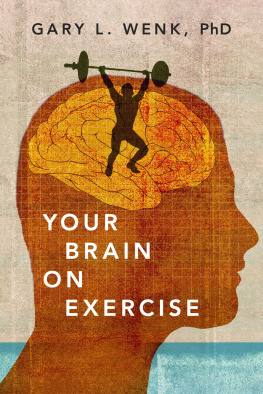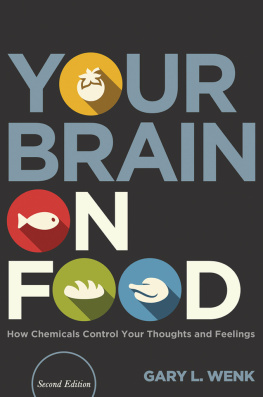Gary L. Wenk - Your Brain on Exercise
Here you can read online Gary L. Wenk - Your Brain on Exercise full text of the book (entire story) in english for free. Download pdf and epub, get meaning, cover and reviews about this ebook. year: 2020, publisher: Oxford University Press, genre: Romance novel. Description of the work, (preface) as well as reviews are available. Best literature library LitArk.com created for fans of good reading and offers a wide selection of genres:
Romance novel
Science fiction
Adventure
Detective
Science
History
Home and family
Prose
Art
Politics
Computer
Non-fiction
Religion
Business
Children
Humor
Choose a favorite category and find really read worthwhile books. Enjoy immersion in the world of imagination, feel the emotions of the characters or learn something new for yourself, make an fascinating discovery.
- Book:Your Brain on Exercise
- Author:
- Publisher:Oxford University Press
- Genre:
- Year:2020
- Rating:3 / 5
- Favourites:Add to favourites
- Your mark:
- 60
- 1
- 2
- 3
- 4
- 5
Your Brain on Exercise: summary, description and annotation
We offer to read an annotation, description, summary or preface (depends on what the author of the book "Your Brain on Exercise" wrote himself). If you haven't found the necessary information about the book — write in the comments, we will try to find it.
Your Brain on Exercise — read online for free the complete book (whole text) full work
Below is the text of the book, divided by pages. System saving the place of the last page read, allows you to conveniently read the book "Your Brain on Exercise" online for free, without having to search again every time where you left off. Put a bookmark, and you can go to the page where you finished reading at any time.
Font size:
Interval:
Bookmark:


Oxford University Press is a department of the University of Oxford. It furthers the Universitys objective of excellence in research, scholarship, and education by publishing worldwide. Oxford is a registered trade mark of Oxford University Press in the UK and certain other countries.
Published in the United States of America by Oxford University Press
198 Madison Avenue, New York, NY 10016, United States of America.
Oxford University Press 2021
All rights reserved. No part of this publication may be reproduced, stored in a retrieval system, or transmitted, in any form or by any means, without the prior permission in writing of Oxford University Press, or as expressly permitted by law, by license, or under terms agreed with the appropriate reproduction rights organization. Inquiries concerning reproduction outside the scope of the above should be sent to the Rights Department, Oxford University Press, at the address above.
You must not circulate this work in any other form and you must impose this same condition on any acquirer.
Library of Congress Cataloging-in-Publication Data
Names: Wenk, Gary L, author.
Title: Your brain on exercise / Gary L. Wenk, PhD.
Description: New York, NY : Oxford University Press, [2021] |
Includes bibliographical references and index.
Identifiers: LCCN 2020025000 (print) | LCCN 2020025001 (ebook) |
ISBN 9780190051044 (hardback) | ISBN 9780190051068 (epub)
Subjects: LCSH: BrainPhysiology. | ExerciseHealth aspects.
Classification: LCC QP376 .W465 2021 (print) | LCC QP376 (ebook) |
DDC 612.8/2dc23
LC record available at https://lccn.loc.gov/2020025000
LC ebook record available at https://lccn.loc.gov/2020025001
This book is dedicated to my amazing wife, who insisted that every day I close my computer and join her for a long walk. Her wisdom gave birth to the core of my story. This book is dedicated to Jane.
I cannot express enough thanks to Joan Bossert, my wonderful editor at Oxford University Press. I offer my sincere appreciation for her suggestion to take on this fascinating and challenging topic and for her inspired guidance along the way.
When a new drug is discovered, such as Prozac, or an old drug is rediscovered, such as marijuana, claims that the long-sought-after panacea has been finally discovered reverberate through social media; books are written extolling the amazing health benefits that everyone can now easily access. Whatever your actual illness or mental condition, for only a few dollars, this new drug is your answer. In my long career studying the effects of drugs and nutrients on the brain I have witnessed the ephemeral excitement quickly fade after closer examination. I depend on my colleagues in other research laboratories, as they depend on me, to report the truth and tamp down the enthusiasm created by false claims. This correction process always happens. Unfortunately, sometimes it can take a while.
Exercise has become one of these new drugs. The claims about the benefits of exercise are numerous and sometimes outrageous. Some claims are true and are supported by available scientific evidence, while others are not. Decades of excellent research have demonstrated that regular modest levels of exercise improve heart and lung function and may relieve joint pain. Regular daily exercise will help your body to regulate blood sugar levels and reduce inflammation; many of these benefits are a consequence of reducing the amount of body fat you carry around. Your body clearly benefits in many ways from regular exercising.
But does your brain benefit as well? The answer depends on how you frame the question. Publications in the scientific and popular literature provide a confusing blend of information and misinformation about the potential benefits of exercise for the brain. In my opinion, our current state of knowledge about the benefits and risks of exercise parallels the state of our knowledge about the benefits and risks of drugs that act on the brain. There is very little reliable information to make definitive statements that apply to everyone under all possible conditions of health and illness.
Consider one popular drug, marijuana. Depending on your particular political, religious, or cultural bias it is possible to find evidence in the scientific literature that can support a strong case both for and against the use of marijuana. It all depends on how you ask the question and how well the scientific inquiry was conducted. As I prepared this book, I discovered that the popular literature contains many claims about the benefits of exercise on the brain that the available scientific evidence does not entirely support. Many times, original scientific publications were quoted by authors who lack the necessary training to understand the article and who then misinterpreted the findings to fit into their preconceived narrative about the benefits of exercise. Needless to say, similar misrepresentations exist regarding the benefits and risks of medical marijuana.
In order to understand the effects of exercise on the human brain, it is necessary to understand how your brain functions and how your muscles communicate with your brain to influence those functions. The misrepresentations in the popular literature persist and are rarely corrected because the actual story is quite complicated and there is still a lot to be discovered about the effects of exercise on brain function. Whenever there is a gap in our current knowledge, myths rush in to fill the empty spaces until they are swept out by new discoveries and a more accurate understanding. For these reasons some myths about exercise have been much harder to dislodge than others.
One thing is certain: Regular exercise benefits the body. Does regular exercise positively affect brain function? Does our thinking become faster because we exercise? Does running a marathon make us smarter? My goal in the following chapters is to provide a realistic perspective on what benefits your brain should expect to achieve from exercise. When you consume any medicine, you have expectations about the benefits that you should obtain and also recognize that there are consequences; these are called side effects. For example, aspirin relieves skeletal and muscular pain but also irritates the lining of the stomach and intestines and causes increased intestinal bleeding. In addition, taking more of a drug often (but not always) provides more benefit but also leads to more severe side effects. We accept the risks in order to obtain the benefits. As you will learn in the following chapters, the same overall principle holds true for exercise; a little is good, but too much can be harmful, particularly for the brain. The following chapters will discuss why this is so.
In order for exercise to influence the brain, the muscles involved must somehow communicate with it. Long ago, it was thought that active muscles communicated with the brain via electrical impulses from sensory nerves originating within muscles. This method of communication with the brain is now considered highly unlikely. When the spinal cord is severed, thus preventing both afferent and efferent electrical flow into and out of the brain, contraction of paralyzed muscles by direct electrical stimulation generated the same beneficial physiological changes in the brain as seen in active muscles of normal individuals. Therefore, the current understanding is that actively contracting skeletal muscles communicate with the brain, as well as many other organs, by releasing chemical messengers into the blood. During the past few years, many muscle-derived chemical messengers have been discoveredso many, in fact, that your muscles might be more accurately viewed as one of your endocrine glands, similar to your adrenal or thyroid glands.
Font size:
Interval:
Bookmark:
Similar books «Your Brain on Exercise»
Look at similar books to Your Brain on Exercise. We have selected literature similar in name and meaning in the hope of providing readers with more options to find new, interesting, not yet read works.
Discussion, reviews of the book Your Brain on Exercise and just readers' own opinions. Leave your comments, write what you think about the work, its meaning or the main characters. Specify what exactly you liked and what you didn't like, and why you think so.












